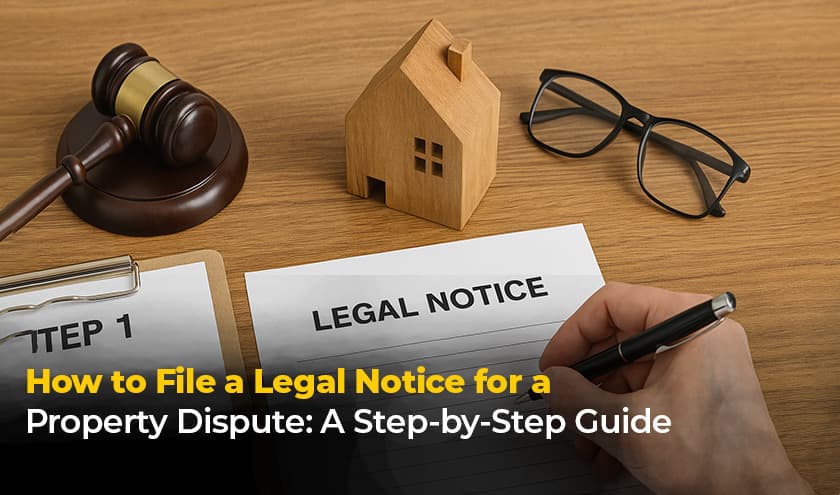How to File a Legal Notice for a Property Dispute: A Step-by-Step Guide

Imagine discovering that a co-owner of your property has made unauthorized changes or someone is encroaching on your land. Property disputes like these are stressful, but knowing how to respond legally can protect your rights. Filing a legal notice is often the first formal step toward resolving property disagreements, ensuring your position is clearly documented and legally recognized.
Introduction: Property Disputes and Legal Notices
Property disputes are one of the most common legal challenges faced by individuals and businesses in India. Whether it involves boundary issues, joint ownership conflicts, or inheritance disagreements, taking prompt legal action is crucial. This guide will walk you through the process of filing a legal notice for a property dispute, offering practical advice, step-by-step guidance, and insights from expert property lawyers. At VakeelSaab, we help clients navigate these disputes efficiently, ensuring their rights are protected while aiming for timely resolution.
Understanding the Legal Framework
What is a Legal Notice for Property Dispute?
A legal notice for property dispute is a formal communication sent by a property owner or their lawyer to the opposing party, highlighting the dispute and requesting remedial action before initiating court proceedings. It serves multiple purposes:
- Gives the other party an opportunity to settle the matter amicably
- Establishes a legal record of your claims
- Strengthens your case if the dispute escalates to court
Relevant Laws in India
Several laws govern property disputes in India:
- Transfer of Property Act, 1882 – Governs ownership and property transfer rights
- Indian Contract Act, 1872 – Useful in cases involving agreements and breaches
- Specific Relief Act, 1963 – Provides remedies for property rights violations
Understanding these laws helps you frame a notice that is legally sound and increases the chances of dispute resolution.
Key Issues in Property Disputes
Property disputes often arise due to:
- Boundary encroachments by neighbors or co-owners
- Breach of property sale or lease agreements
- Inheritance and succession conflicts
- Unauthorized construction or modifications
Many property owners underestimate the importance of a well-drafted legal notice, which can lead to prolonged litigation and unnecessary costs. Consulting a property dispute lawyer early on ensures the notice is legally accurate and strategically effective.
Step-by-Step Guide to Filing a Legal Notice
1. Consult a Property Lawyer
Start with a professional consultation. A Property Lawyer Online in India or Property Lawyer in Delhi can help evaluate your case and draft the notice. Online lawyer consultation is particularly convenient if you cannot meet in person.
2. Gather Necessary Documents
Prepare relevant documents such as:
- Property title deeds
- Sale agreements or lease contracts
- Previous correspondences with the opposing party
- Survey reports or municipal records
Having complete documentation strengthens your notice and makes it more credible.
3. Drafting the Legal Notice
Your legal notice should include:
- Names and addresses of both parties
- Clear description of the property and dispute
- Specific relief or action requested
- A timeline for response (usually 15–30 days)
- Legal consequences if ignored
This ensures your notice is precise, formal, and enforceable.
4. Sending the Notice
Send the notice via registered post with acknowledgment or through a legal courier service. Some lawyers may also file notices electronically if the court accepts digital correspondence.
5. Response and Follow-Up
If the opposing party responds positively, you may reach an amicable settlement. If ignored, your lawyer can guide you in initiating formal legal proceedings in civil court, based on the documented notice.
Case Studies / Examples
Case Study 1: Mr. Sharma faced encroachment by a neighbor. After sending a legal notice for property dispute through his property dispute lawyer, the neighbor removed the encroachment within 20 days, avoiding court intervention.
Case Study 2: Ms. Mehta’s co-owner refused to sell her share of inherited property. A well-drafted notice clarified her legal rights, resulting in negotiation and eventual agreement without prolonged litigation.
These examples highlight how an effective legal notice can resolve disputes efficiently.
Best Practices for Property Dispute Resolution
- Always consult a qualified property lawyer before taking action
- Keep all communications documented
- Avoid aggressive language in notices; remain professional and factual
- Consider mediation or alternative dispute resolution methods to save time and costs
- Follow up promptly on responses to maintain legal advantage
Call to Action
If you are dealing with a property dispute, VakeelSaab’s expert property dispute lawyers can guide you at every step—from drafting a legal notice to full dispute resolution. Schedule an online lawyer consultation today for personalized advice tailored to your situation. Contact us at VakeelSaab to protect your property rights effectively.
FAQ
Q1: How long does it take for a legal notice to get a response? Typically 15–30 days, depending on the urgency and complexity of the dispute.
Q2: Can I file a legal notice without a lawyer? Yes, but a property dispute lawyer ensures your notice is legally sound and strategically effective.
Q3: What happens if the notice is ignored? You may proceed with civil litigation using the notice as evidence.
Q4: Do I need a lawyer to send a legal notice? It’s highly recommended. A Property Lawyer ensures the notice is legally valid and effective.
Related Articles
The Importance of Consulting a Property Lawyer for Real Estate Issues
Blog
How to File a POCSO Complaint in India: Step-by-Step Legal Process
Blog
What punishments does the law give for giving, taking, or asking for dowry?
Blog
Reasons for the Increasing Divorce Rates in India
Blog
What is a Special Leave Petition? Meaning, Features, Process & & Who Can File?
Blog
What Is the Difference Between Mutual Divorce and Contested Divorce?
Blog